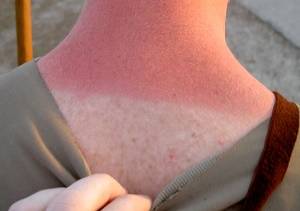SUNBURN REMEDIES: Use this list of handy tips to treat mild sunburn and prevent sun overexposure.
The recommendation from health experts is to use adequate sunscreen. Even so, it is far too easy for fair coloured skin to get sunburnt.
When the sun burns human skin it produces several common signs and symptoms of sunburn. The skin feels hot and tender to touch.
Sunburned skin starts reddening followed by an irritable itchiness. Mild sunburn often results in flaky patches and peeling before it regenerates.
As a rule, the sunburnt skin recovery process takes around one week. But, having an unwelcome case of sunburn is going to be uncomfortable and irritating for at least a few days.
It is the ultraviolet (UV) rays of the sun that causes most of the skin damage. In fact, UV overexposure can lead to premature skin ageing and skin cancer in severe cases.
What should you do if your skin got a little burnt after enjoying a day in the sunshine? What natural steps can you take to get some relief and hasten the healing process? This guide provides a few simple sunburn treatment and prevention tips.
7 Simple Ways to Relieve Sunburn Itching
The NHS has a wealth of advice on all matters relating to public health in the United Kingdom. They also have some tips explaining how to treat sunburn redness and sun blisters.
Once you notice the scarlet redness of sunburn on your skin you should get out of the sun. Go indoors or find a shady area without delay. Often, you can cure a case of mild sunburn at home by following these seven steps:
- The affected skin needs cooling down. Apply cool water to the sunburnt area or take a shower in lukewarm or tepid water.
- Applying a wet sponge or flannel over the burnt skin may also relive some suffering.
- Moisturise the area of skin most affected. Soothing lotions such as aloe vera are most likely to produce some fast relief.
- Try using a hydrocortisone cream to reduce inflammation. These creams also reduce redness, itching, and swelling associated with skin conditions. Your local pharmacy will sell hydrocortisone cream and without the need for NHS prescriptions.
- Reduce the risk of dehydration by drinking plenty of water. Even though drinking water is not one of the cures for sunburn, you must stay hydrated. There are several effects of getting burnt by the sun. It draws body fluid to the surface of the skin. Thus, drink a lot more water than you usually would to help stay hydrated.
- Paracetamol and ibuprofen are painkillers. Taking medication to relieve the pain may also help. But, never give aspirin to anyone who is under the age of 16 years.
- Avoid going back out into the sun at all costs. You must keep burnt skin covered up and out of more UV rays. Thus, wearing some loose fitting clothing that allows it to breathe is ideal. Try to avoid wearing material that irritates your skin.
When does Sunburn need Medical Attention?
There may be a point when the burn or blistering is so bad that you should visit a doctor. The National Health Service has specific advice on cases of severe sunburn.
They say to contact your GP or visit a walk-in medical centre. This would be particularly important if a large body area is burnt badly.
Severe sunburn symptoms include:
- Skin reddening or pinkness often with fluid-filled blisters.
- Localised swelling causing pain, itching, and tenderness.
- Body chills or a high body temperature of 38°C (or higher).
- Heat exhaustion with hot skin.
- This may lead to fever, dizziness, fatigue, headaches, and nausea.

Note: Always seek medical advice for any cases of severe burning.
Ways to Treat Severe Sunburn
Cases of severe sunburn are best treated at the surgery of your General Practitioner. As a rule, they will give you special burn cream and some skin dressings. In the most extreme cases you could get referred to a hospital for sun burn skin treatment.
3 Sunburn Prevention Tips
- Pardon the UK rules for stating it but wearing sun cream is among the best sunburn prevention tips. The NHS recommend 35ml (which is 6 to 8 teaspoons) of sun lotion to cover the bodies of most adults. In other words many people apply sun cream too ‘sparingly‘.
- Always apply plenty of sunblock before you get exposed to the sun for lengthy periods. Most sun cream products recommend applying it at least 30 minutes before you go outdoors. Then reapply the cream once more before going outside.
- You should spread it on all exposed body parts. A water resistant sun cream is important if you will be exercising, sweating, or going into water. Those who burn easily should wear loose clothing with long sleeves and legs to cover more skin.

